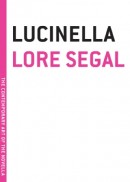 Frances Evangelista, who blogs at Nonsuch Book, is devoting August to reading (and blogging about) all 42 entries in Melville House’s Art of the Novella series. A little less than midway through the month, she’s a bit behind pace, having completed 15 of the books. But it still seems possible she will complete the goal, which would be impressive. Melville House joined in the fun by challenging other readers to join Evangelista and compete for prizes throughout the month. The interested are urged to join at nine levels, including Curious (one novella), Passionate (nine novellas), and Fanatical (27 novellas).
Frances Evangelista, who blogs at Nonsuch Book, is devoting August to reading (and blogging about) all 42 entries in Melville House’s Art of the Novella series. A little less than midway through the month, she’s a bit behind pace, having completed 15 of the books. But it still seems possible she will complete the goal, which would be impressive. Melville House joined in the fun by challenging other readers to join Evangelista and compete for prizes throughout the month. The interested are urged to join at nine levels, including Curious (one novella), Passionate (nine novellas), and Fanatical (27 novellas).
Between other reading plans and additional scheduling conflicts, I’m only safely in on the Curious level. Last week, I read Lucinella by Lore Segal. It was originally published in 1976, and is actually part of Melville House’s “contemporary” Art of the Novella series. Whether this qualifies to satisfy my Curious requirement, I don’t know. Life can be confusing.
Lucinella is very funny. It opens at Yaddo, the artists’ colony, where the eponymous narrator describes her fellow guests, “five poets, four men, one woman, and an obese dog called Winifred.” (An early instance of Segal’s sense of humor: “Because Winifred is a real dog I have changed his sex to protect his privacy.”) The book follows the group at Yaddo, and then to New York City, as they fret about reviews, fight over poetic strategies, and fall into various cocktail parties and beds. It is, in short, a satire of the writing life.
It’s full of pithy descriptions (“She’s forty, five foot by four by four, and a genuine Russian.”), well-orchestrated group scenes, and modest, sometimes faintly dated experimentation. It builds to a conclusion that I found quite moving. And it contains the exchange below, which is now one of my all-time favorites. Lucinella has been haranguing her boyfriend William for his habits, which keep her from ever keeping the house in order (”William, how come you do everything wrong all the time?”). We pick it up from there:
“William? How come you never nag me?”
“What about?” asks William.
“Whatever you can’t stand about me.”
William is thinking. “When you keep nagging I sometimes want to murder you, but I can stand it.”
“Why don’t you tell me to straighten out my towel on the rack?”
“Because I don’t care if it’s scrumpled.”
“But, William, a scrumpled towel cannot dry!”
“Lucinella, sweetheart, love! A dry towel does not move my imagination!”
“Nag me. Go on,” I say.
William looks harried. “You’re a slob,” he says.
“No, I mean something true about me. Go on.”
“You are a true slob,” William says.
“A slob, William! I! Who can neither eat nor write nor love so long as my house is not in perfect order, how am I a slob?”
“Your towel is scrumpled in the bathroom. Lucinella, I don’t care—”
“Ah, but,” I say, “that’s different, don’t you see, that’s only because I haven’t got around yet to straightening it out. Nag me some more.”
“The kitchen,” says William, “is in such a shambles we have to eat out.”
“Only till I find the right Contact paper,” I explain, “which they no longer manufacture. Go on.”

